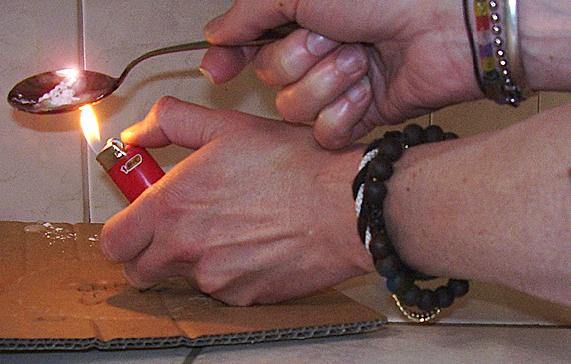The Heroin Epidemic
Drug Addiction on the rise says National Survey

Author/Photographer: Hendrike (2001) through Creative Commons
Boiling up heroin.
Heroin. This dangerous drug has made recent headlines because of the recent overdose of the famous actor, Phillip Seymour Hoffman. What they may not realize is that, according to the National Survey on Drug Use and Health, the number of people who have become addicted to heroin has increased 60 percent in the last 10 years. Here in Massachusetts, the Boston Globe reports that over 185 people have died from heroin overdoses since November 1, 2013 alone, including at least 20 people in Plymouth County. In recognition of this heroin problem, on March 27 Governor Patrick declared a public health emergency.
Heroin is an opioid drug made from morphine, a powerful painkiller which comes from the Asian opium poppy plant. Heroin is usually in the form of a white powder, a brown powder, or a black sticky substance. Heroin can be snorted, injected with a needle, or smoked. At first, heroin gives users a “rush of good feelings. But then users can feel sick to their stomachs and itchy and can have trouble breathing as heroin slows down their heart rates and their breathing rates. They can even go into a coma and die. Heroin is a highly addictive drug and as a person takes more of the drug, the high may not be as strong. This leads the user to take more and more heroin to feel the high making a user more likely to overdose. For more information the National Institute on Drug Abuse (NIDA) for Teens has a wealth of knowledge on the subject.
According to the United States Department of Justice Drug Enforcement Administration’s 2013 National Drugs Threat Assessment Summary, some heroin users first became addicted to prescription painkillers. According to this report, heroin use will likely continue to spread because heroin is cheaper and more easily obtained than prescription drugs and produces similar effects. The report also states that heroin purity and dosage amounts can vary, and users do not know what substances the heroin may have been cut with. This puts users more at risk of an accidental overdose.
Heroin addiction is not just hurting addicts and their families. It hurts society as a whole. According to Steven Kassels, M.D., in an Op-Ed piece for the Boston Globe, when viewing the costs of heroin addiction in terms of law enforcement, increased crime, court costs, incarceration, emergency room visits, hospitalizations, lost job productivity, and workers’ compensation, the national annual cost is over $180 billion dollars. Dr. Kassels estimates that in order to treat one drug addict in Massachusetts, including counseling, random drug testing, medical examinations, and testing for diseases that can be spread from sharing needles (like HIV or hepatitis C), the cost is about $5,000 per year. If someone is placed in a halfway house, it can cost $20,000 per year, while incarceration can cost $50,000 per year. The heroin epidemic in the United States must be controlled and national and state governments need to work together to raise awareness about the dangers of heroin.

Matt is a member of the class of 2016 . He joined the staff of the Green Wave Gazette his sophomore year after being a contributor in his freshman year....
